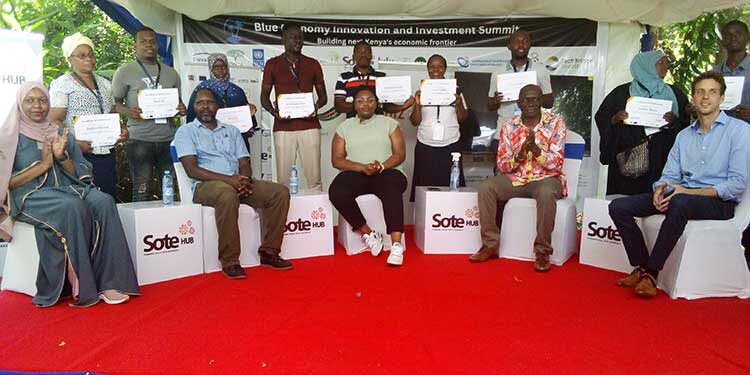Efforts to tap into the largely unexploited blue economy due to capacity constraint has received a huge boost after 200 Micro, Small, and Medium Enterprises (MSMEs) in the industry from the six coastal counties received 16 weeks of training.
Funded under the EU Action on Go Blue, the project is targeting blue value chains with a high potential impact on job creation, in Taita Taveta, Kilifi, Mombasa, Lamu, and Tana River counties.
These sectors include aquaculture, tourism, boat repair services, fish handling and processing, maritime security, and transport and logistics.
David Ogiga, the founder of Sote Hub, which coordinated the training said that the need to run their business ventures professionally is what informed the Programme.
The training focused on opportunity analysis, product development, team dynamics, SME financing, and record keeping. They were also paired with industry mentors and experts to gain practical experience through field visits.
Henrik Schmidtke, Component Leader at GIZ Kenya said that the blue economy has huge potential, which must be tackled through partnerships, integration, and capacity building. “A lot of synergies are needed to unlock the sector”, he said.
“We have decided more and more to focus on higher added values projects in the coastal area since it holds great potential as well as safeguards environmental and climate balance either in marine or forest biodiversity. We face great challenges and smart solutions are many times the answer,” Schmidtke said.
Jackeline Tindika, of Aqua Sted, a fish farming SME based in Kilifi County and one of the beneficiaries said that she is now able to breed more new varieties of fish and production of manure which she hopes will boost her income in the coming months, after the training.
“One of the most important lessons I have learned is the need to partner with my competitors on areas they are more superior than my venture,” Elizabeth Njeri, who runs AA Network Ltd, an SME that provides human transport said.
Mwatime Amadi, of Ganze Women Group, which provides tour guiding services said that they have now gained the skills of handling tourists better.
“We have learned how to network and market our services abroad to the tourist who intends to visit our area, which has increased the number of visitors from a low of 120 visitors per month during the Covid-19 period to about 250 last month,” she said, adding that they have added two more workers, raising the number to 28.
Some of the notable achievements, according to Ken Njihia, who oversees Innovations at Sote Hub, SMEs that participated in the Programme recorded an income rise of between 10-50%.
At least 20% of new green jobs have been created due to access to new markets and other opportunities including funding.
This number is expected to increase when the project gets to the next phase of helping the SMEs in networking with each other, market linkage, and unlocking finances from various sources including banks, Sacco, and government-provided funds such as the Hustler Fund to be launched next month, Njihia said.
“For the first time, we have brought together the majority of ecosystem partners working at the Coastal region to dialogue, to support the dreams and visions of our entrepreneurs and innovators that are capable of making this region the next economic powerhouse in Kenya. I am excited about the future of the Blue Economy, and we want to be part of it” David Ogiga cofounder and Director of Sote Hub said.
The Training comes against a backdrop of the government’s renewed focus to tap into the blue economy. The Western Indian Ocean is said to have resources worth more than KSh2.2 trillion in annual outputs, with Kenya’s share being about 20 percent of this.
The marine fishing sub-sector alone had an annual fish potential of 350,000 metric tonnes worth KSh90 billion in 2013. However, the region only yielded a paltry 9,134 metric tonnes worth KSh2.3 billion.
Infrastructural limitations and inappropriate fishing craft and gear and the lack of properly trained seafarers who can venture into the deep sea have hindered the optimal exploitation of marine fishing.
This article was published by the editorial team at FEAFFA. For any enquiries, contact us via Email: freightlogistics@feaffa.com Tel: +254733780240





